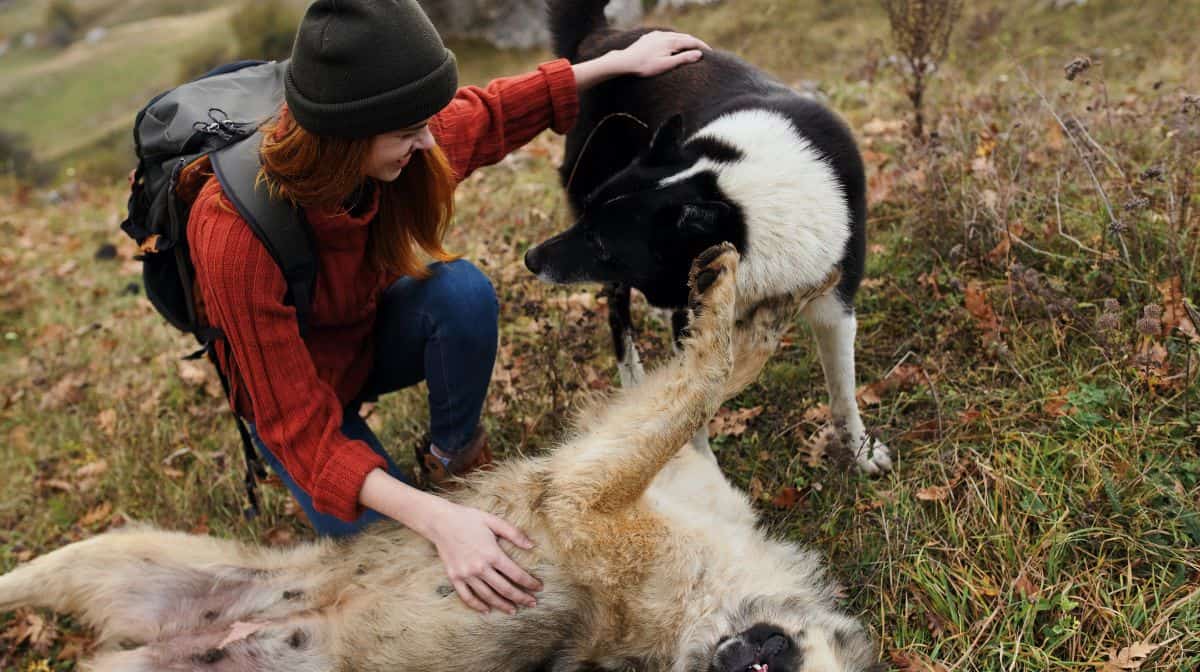How long can a dog go without food before dying? Do you know the causes of stop eating of a dog?
Surviving time for a dog without foods varies based on factors like age, health, breed, and overall condition. But a dog can survive without food for about 5 to 7 days normally. It is also important to know that a dog without access to water can only survive for a few days. Sometimes, dehydration can lead to death.
Besides, it is also true that healthy dogs with adequate body fat reserves might survive longer in comparison with sick, very young, very old, or underweight dog.

Basic Understanding of Canine Nutrition
Canine nutrition is a balanced diet for dogs which includes six essential nutrients: proteins, fats, carbohydrates, vitamins, minerals, and water.
Its protein is sourced from meat, fish, and certain plants, that is necessary for growth, muscle repair, and immune function. And its fats provide energy and support skin and coat health while its carbohydrates offer an energy source and aid in gastrointestinal function.
Additionally, it is the perfect formulation of vitamins and minerals which are necessary for metabolic processes and overall well-being of dogs.
Factors Influencing How Long a Dog Can Survive Without Food
Below mentioned factors are highly considerable to assess the severity of a situation where a dog is not eating. You must consider these factors with concentration.
Age: Young dogs require higher energy and nutritional needs for growth and development. So, it can become weak and vulnerable more quickly. But, adult dogs which have more fat and muscle reserves can survive longer without food. On the other hand, senior dogs which have can reduce their ability to cope without food because of underlying health issues.
Health Status: Dogs with good health and with adequate fat reserves can survive longer without food while sick or injured Dog has less ability to withstand a lack of food.
Size and Breed: Because of having higher metabolic rates of small breeds, it has less ability to survive long periods without food. Larger breeds have more fat reserves that help to last longer without food.
Body Condition: Also, overweight Dogs may survive longer without food owing to higher fat reserves. But, these will not true for all dogs. But, underweight which have fewer reserves will be weak more quickly without food.
Hydration: If you ensure access to water for dogs without food can survive longer. Because, hydration can slow the death. Water deprivation is the major cause of quick death dog especially for those which do not eat food.
Environmental Conditions: Furthermore, surrounding environment largely influence on dogs health. Extreme temperatures can increase metabolic demands while cold weather increases the need for calories to maintain body heat. So, hot weather is not favorable and exacerbates dehydration and heat stress.
Activity Level: Active dogs with more calories will deplete their energy reserves faster than those of sedentary dogs. That’s way, dog with active physics are more capable of retaining power of body during starvation.
Reasons Why a Dog Might Stop Eating
Here, I mention all reasonable causes of stop eating food of your dog. If you are a dog owner, you should read this necessary information.
Illness or Infection: Gastrointestinal disorders, kidney disease, liver disease, pancreatitis, or cancer can is the major causes of loss of appetite.
Dental Problems: If your dogs have tooth pain, gum disease, or oral infections, it can leave food because of painful experience.
Medications: Some medications have side of the eagerness of eating food. Such as, nausea that can reduces appetite as side effects.
Stress and Anxiety: Additionally, some changes in the household, new pets, loud noises, or moving to a new home can enhance stress and anxiety that leads to a reduced appetite.
Depression: Due to the loss of a companion, major changes in their environment and lack of stimulation, dogs feel depression. And, this depression leads to reduced rate of food intake.
Changes in Routine: In addition to , alterations in feeding times, new locations for food bowls, or changes in daily routine is also responsible for reduced eating. Basically, it can largely affect a dog’s eating habits and eating rates.
Food Quality: Also, dogs cannot like to eat spoiled or stale food, or food. They don’t taste these types food and refuse to eat.
Sudden Diet Changes: Abrupt changes in diet can cause digestive upset or aversion to the new food that encourage reduced eating.
Food Intolerance or Allergy: Because of a reaction to certain ingredients in their food, dogs stop eating food drastically.
Picky Eating: Some dogs develop picky eating habits and show less interested in their regular dog food.
Signs of Serious Concern
This section describes of visible and invisible signs for identifying the impact of starvation for a dog. You must read this section with emphasize
Significant Weight Loss: Rapid weight loss is the main indicator of serious health issue. If you notice these types of signs in your dogs, you must call veterinary immediately.
Weakness: Additionally, you can find out the serious health issues by observing some signs. Such as A lack of energy, reluctance to move or excessive sleeping can be signs of illness, pain, or severe nutritional deficiency.
Vomiting or Diarrhea: Persistent vomiting or diarrhea is not the good signs of dog health. This can lead to dehydration. Besides, it indicates gastrointestinal issues, infections, or other serious conditions.
Dehydration: Dry gums, excessive panting, loss of skin elasticity, and sunken eyes are the common indicator of dehydration. These types of dehydration are a state of emergency medical.
Behavioral Changes: Sudden changes in behavior also help you to understand the signs of serious effect of starvation.
What to Do If You’re Dog Isn’t Eating
Monitor Behavior: Firstly, you attentively monitor some specific symptoms such as lethargy, vomiting, diarrhea, coughing, or behavioral changes.
Check Food and Environment: Then, you check whether your served food is fresh or not and surrounding environment enhances stress or not.
Check for Dehydration: For checking dehydration, you can help of gum test because Dehydration can quickly become life-threatening.
Change Food: Furthermore, you offer a different type of food to reduce boredom with their regular food. You can warm food for making aromatic and enticing taste with flavor.
Change Feeding Routine: As well as, you must maintain a consistent feeding schedule. This ensures a sense of security.
Calm Environment: Ensuring a quiet, calm eating area to reduce stress from noise or other pets. This friendly environment helps to reduce stress and anxiety.
Rule out Medical Issues: Sometimes, injury, dental problems would be the cause of pain and less eating. So, you must be alert to symptoms like vomiting, diarrhea, or behavioral changes.
Consult a Veterinarian: If your dog refuses to eat for more than 24-48 hours, you must consult with an experienced veterinarian. Basically, they confirm blood tests, x-rays, or other diagnostics to determine the cause of the appetite loss.
Frequently Asked Questions (FAQs)
1. How long will a dog live once they stop eating?
Generally, a dog can survive without food for about 5 to 14 days. Though it depends on health, hydration, and environment. If you observe any changes in your dog’s regarding eating habit, you should consult with a veterinarian.
2. Do dogs pass away in their sleep?
If your dogs are elderly or severely ill, it can pass away in their sleep because of natural causes such as organ failure or other underlying health conditions.
3. How long can a sick dog live without food?
A sick dog might survive for about three to five days without food, though it largely depends on the severity of the illness and the dog’s overall health. You should consult with a veterinarian immediately if you obverse your dogs do not eat.
4. How long can a small dog go without eating?
Generally, a small dog can generally survive for three to five days without food. Basically, this duration largely depend on its health and hydration status. It is true that smaller dogs may be more vulnerable because of starvation. So, you should consult with a veterinary promptly
Conclusion
How long can a dog go without food before dying? Typically, a dog can survive for three to five days without food depending on dog’s size, age, health, and hydration status.
If your dog’s pass for few days without food, it must have preceded to severe health issues. So, it is your duty to consult with an experienced veterinarian if your dog stops eating.




